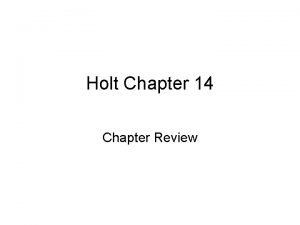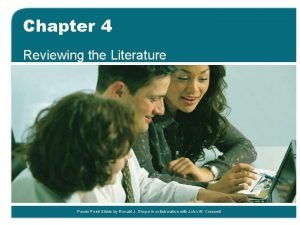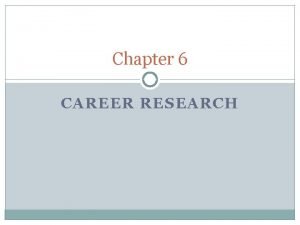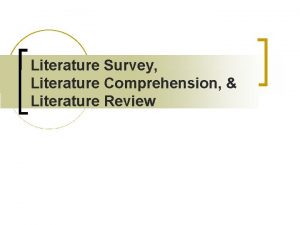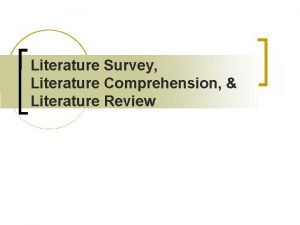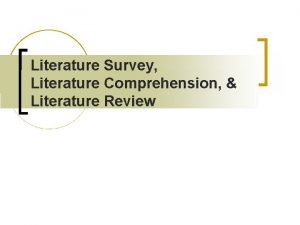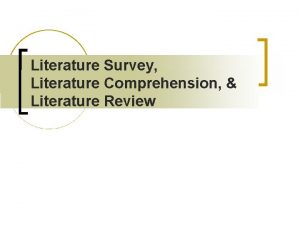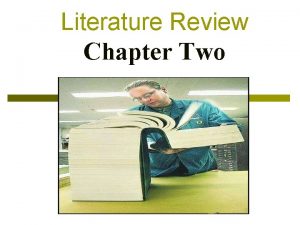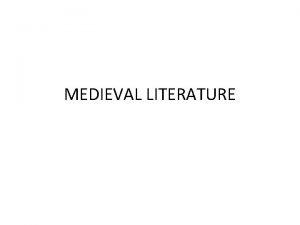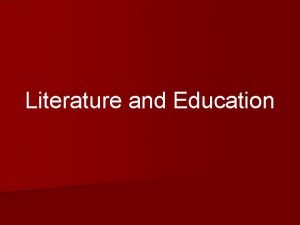Chapter 5 The Literature Review The Literature Review














- Slides: 14

Chapter 5 The Literature Review

The Literature Review A critical component of the research process that provides an in-depth analysis of recently published research findings relevant to the study that is being considered. The review informs the research question and guides development of the research plan.

Rationale for the Literature Review • Adds credence to the importance of the topic • Provides studies that can be replicated • Locates instruments that have already been tested • Reveals appropriate theoretical frameworks • Establishes the basis for the subject under study • Enhances the body of knowledge regarding a specific issue

Types of Literature for the Review • Primary or Secondary sources • Theoretical or Empirical literature • Seminal works

The Search Strategy • • • Identify search terms Develop a search statement Locate appropriate sources of literature Perform the search Appraise the studies for quality and value

The Literature Search for Research • • Provides background and context Incorporates a theoretical framework Specific to a single research question Scholarly works from peer-reviewed sources • Critical appraisal of single focused research reports

The Literature Search for Practice • Focused on a clinical question limited in time frame • Focuses on application of research to practice • Specific to a clinical question • From works in peer reviewed journals • Critical appraisal of single studies and aggregate research reports

The Literature Review Process • Identify the research problem and review the question • Plan the information retrieval process • Carry out the search strategy • Screen the initial list of citations and abstracts for relevance • Retrieve full text of relevant studies • Critically appraise the study quality and findings • Summarize and synthesize the findings

Creating a Strong Literature Review • • • Identify the research problem and question Select the resources Identify inclusion and exclusion criteria Build the search strategy and conduct the search Screen the initial list of citations and organize them Retrieve the full text of relevant studies and summarize • Critically appraise the study quality and findings • Summarize and synthesize the findings

Appropriate Resources for the Literature Search Includes: • Electronic databases • Books • Dissertations • Websites • Journals

Peer Review One of the hallmarks of research Quantitative • Thorough analysis focusing on potential sources of bias and error • Applies strict standards to the evaluation of methodology and design Qualitative • Focuses on efforts the author has made to ensure credibility and trustworthiness

Open Access “…digital, online, free of charge, and free of most copyright and licensing restrictions” (http: //legacy. earlham. edu/~peters/fos/overview. htm)

Competent Nurses Need to Possess Literacy Skills • Identify and succinctly state question or problem to be researched • Use of appropriate resources • Create effective search strategies • Critical thinking and analysis skills • Integrate evidence into practice • Competence with computers • Lifelong learning

Evidence Pyramid – 6 S Model • • • Systems Summaries Synopses of Syntheses Synopses of Studies
 Chapter review motion part a vocabulary review answer key
Chapter review motion part a vocabulary review answer key Literature review in ppt
Literature review in ppt Chapter 6 career readiness chapter review answers
Chapter 6 career readiness chapter review answers Hát kết hợp bộ gõ cơ thể
Hát kết hợp bộ gõ cơ thể Slidetodoc
Slidetodoc Bổ thể
Bổ thể Tỉ lệ cơ thể trẻ em
Tỉ lệ cơ thể trẻ em Gấu đi như thế nào
Gấu đi như thế nào Tư thế worm breton là gì
Tư thế worm breton là gì Bài hát chúa yêu trần thế alleluia
Bài hát chúa yêu trần thế alleluia Các môn thể thao bắt đầu bằng tiếng chạy
Các môn thể thao bắt đầu bằng tiếng chạy Thế nào là hệ số cao nhất
Thế nào là hệ số cao nhất Các châu lục và đại dương trên thế giới
Các châu lục và đại dương trên thế giới Công thức tính độ biến thiên đông lượng
Công thức tính độ biến thiên đông lượng Trời xanh đây là của chúng ta thể thơ
Trời xanh đây là của chúng ta thể thơ
